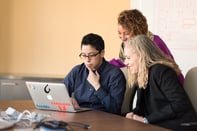Published on
Moving from a Career Services Department to a Career Enablement Commitment

It’s not a surprise for us in higher education to find out that the forlorn career services department has a target on its back yet again. In the age of Handshake and Zoom, some experts are pondering where the true value of traditional career services lies rather than evaluating institutions’ broader shortfall in thinking about career support for students.
For decades, career services was tasked with roughly the same job as the reworked lot in 1980s automotive manufacturing or the quality assurance function in software: fix a problem at the last stage of a process.
Career services might be one of the most important yet underappreciated functions in higher education; for some students, it is an afterthought rather than an essential tool that should be accessed at the very beginning of a student’s academic journey. In fact, a striking two out of three college graduates leave school feeling ill prepared to enter the workforce.
As security is embedded at every phase of the software development life cycle, career services should be embedded at every touchpoint of the student journey. And as educators, our mission is to equip students with the resources they need to feel prepared and empowered to confidently enter the workforce and meet their future employers” demands.
At DeVry University, we’ve made significant headway in reimagining career services and embed the department in the fabric of our academic framework and the student experience.
Career Services Must Be an All-Encompassing Component of the Student Journey
DeVry’s recalibrated model for career services delivers digestible and easy-to-use resources at the right time and place during students’ academic experience, while continuously evolving our curriculum and advising process to reflect the realities of changing workforce needs.
With our approach to service with a mix of technology and human interaction, a student can properly assess what type of support best suits their needs. AI tools allow for self-service resume building, while our career support teams work one on one for interview coaching and preparation. Another example is utilizing technology to pass on job opportunities to our students and alumni using automated search algorithms, then further complementing those job opportunities with access to large-scale corporate partners through relationships established by career services colleagues.
Additionally, we use insights gathered by career services to help inform existing curricula before we make changes on a larger scale. By asking questions related to career outcomes, such as, What tracks within this program provide viable career pathways for students? and What skills would be in high demand in these fields?, we are able to inform curriculum development and course content that mirror real-world needs.
Partnering with Businesses and Organizations Is Key to Achieving an All-Inclusive Approach to Career Services
At DeVry, we take this holistic approach a step further by having our professors incorporate career support activities into the curriculum by embedding elements of career services in students’ academic experience. DeVry’s career services team works year-round to develop connections with companies in many industries, building a network of professionals who are highly engaged with our students and invested in their career trajectories. Moreover, when academic institutions put the work into creating relationships with businesses, they gain access to a wealth of information they can use in the classroom and in the advising office to provide students with real-time job and career insights. These industry connections also allow DeVry to offer students internship and apprenticeship experiences as part of their educational journey.
Career services has always been a foundational element of any well-rounded, robust higher education experience, but it is not enough to simply have a career services department. Institutions need to continually work toward integrating career services into every step of the academic journey to ensure sustained student success while meeting market needs. Creating increased opportunities for students to engage with and use career services helps deliver a return on student investment, ensures employers’ needs are being met and empowers students to make decisions that match their career goals.
Career services is not just a resource; it is an essential component of student success and critical in ensuring students reach their academic and professional goals.
Author Perspective: Administrator



